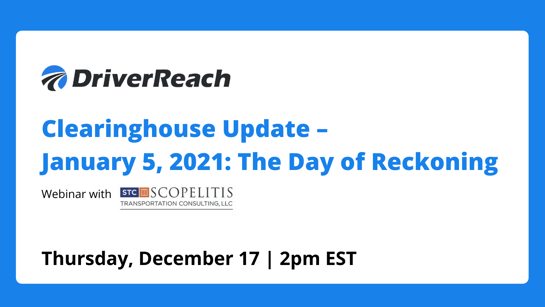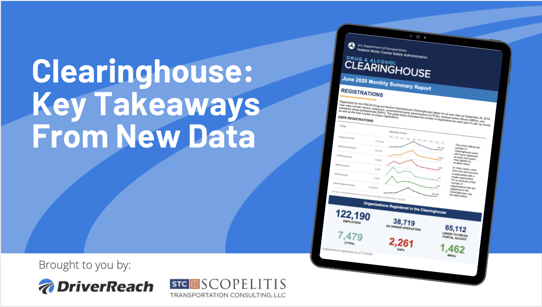By Dave Osiecki & Sean Garney of Scopelitis Transportation Consulting LLC & Regulatory Consultants to DriverReach – April 29, 2020
In late April 2020, the Federal Motor Carrier Safety Administration (FMCSA) published several proposed changes to the rules governing the recently implemented National CDL Drug and Alcohol Clearinghouse (the Clearinghouse). FMCSA’s proposed changes are designed to improve enforcement of the CMV driving prohibition by directing State Driver Licensing Agencies (SDLAs) to refrain from issuing, renewing, transferring or upgrading a CDL or Commercial Learner’s Permit (CLP) based on driver violation information in Clearinghouse.
A little background is in order before getting into the details of FMCSA’s proposal. CMV drivers who violate drug or alcohol testing program rules (e.g., testing positive for marijuana or another controlled substance) are prohibited from operating a CMV until they complete prescribed “return-to-duty” (RTD) requirements. This driving prohibition and the RTD requirements have been in the federal safety rules since the mid-1990s and, historically, have been enforced by the motor carriers. Since January 2020, FMCSA’s new Clearinghouse has improved a motor carrier employer’s ability to identify and keep these ‘disqualified’ drivers off the road until they meet the RTD requirements.
However, there is no current FMCSA requirement that SDLAs take any specific CLP or CDL licensing action if a Clearinghouse record indicates the driver is prohibited from operating. There is a disconnect between the driving prohibition in Clearinghouse rules and the State CDL licensing rules found in a different part of the federal safety rule book. This disconnect is what some might describe as a State licensing loophole. FMCSA’s April 2020 proposal aims to close this loophole.
FMCSA proposed the following changes to the Clearinghouse rules:
- CDL Non-Issuance – The current Clearinghouse rules require SDLAs to check a driver’s status by querying the Clearinghouse prior to issuing, renewing, upgrading or transferring a CLP or CDL. When this query indicates the driver is prohibited from operating a CMV, the proposed rule would require the SDLA to deny the licensing transaction. A driver whose licensing transaction is denied would need to re-apply after completing the RTD requirements.
FMCSA also proposed two different ways in which SDLA would use Clearinghouse information to further improve enforcement of the driving prohibition. They are: - Required Notice – Mandatory Downgrade – If finalized, this approach would require SDLAs to remove the CLP or CDL privilege of any driver after the SDLA receives a required “push” notification from the Clearinghouse that the driver is prohibited from operating. This loss of privilege, or ‘downgrade’, would align a driver’s license status with his or her driving status under the drug and alcohol testing rules thereby closing the loophole that allows these drivers to evade detection.
- Optional Notice of Prohibited Status – This proposed approach would permit, but not require, SDLAs to receive “push” notifications from the Clearinghouse when drivers licensed in their State are prohibited from driving. Under this ‘opt-in’ approach, the State would also receive notification when a driver is able to resume operating a CMV. This approach would not fully close the current loophole that allows these drivers to evade detection.
- Actual Knowledge Report to the Clearinghouse – This proposed change would revise how an “actual knowledge” based on a citation for DUI in a CMV is handled and retained in the Clearinghouse. The proposal is as follows:
- First, the employer’s report would remain in the Clearinghouse even if the driver is not ultimately convicted (current rules allow drivers to submit a DataQs request to remove the violation if the driver isn’t ultimately convicted); and,
- Second, drivers not convicted of the offense of DUI in a CMV could petition FMCSA to add evidence of that fact to the Clearinghouse record.
These proposed changes would ensure the Clearinghouse complies with the statutory requirement that all Part 382 violations are retained for at least 5 years, and that drivers issued a DUI citation actually complete the RTD process as required.
Regulatory Housekeeping – The proposal also takes two steps to clarify the regulations. The first is to make clear that the driver prohibitions, and accompanied SDLA action, apply equally to CLP and CDL holders alike. The second is to add to an explicit driving prohibition for violating drug testing rules to part 392 (rules that deal with actually operating a CMV). This addition to part 392 links State law enforcement of the driving prohibition to federal grant money, and facilitates more roadside enforcement of this provision.
If you’ve made it this far, you’ve probably come to the conclusion that FMCSA’s proposed changes are, indeed, designed to improve the enforcement of the CMV driving prohibition through some much needed regulatory cleanup and, more importantly, by requiring SDLAs not to process certain CLP or CDL licensing transactions when a driver is forbidden from operating a CMV based on Clearinghouse information.
While these proposed changes are currently open for public comment (the deadline for filed comments is June 29, 2020), there’s little doubt FMCSA will finalize some (and perhaps all) of these proposed changes to address the remaining Clearinghouse-related loopholes in order to improve enforcement and promote overall truck and driver safety.
Stay up to date on CDL trucking trends! Be sure to check out the DriverReach blog or follow us on LinkedIn for other relevant articles and head over to our webinars page for an up-to-date list of upcoming events and on-demand recordings.
Interested in seeing DriverReach’s modern Recruiting and Compliance Management System in action? Take DriverReach for a test drive!










